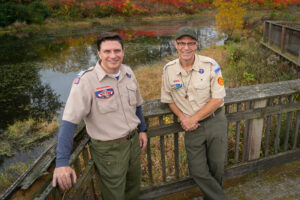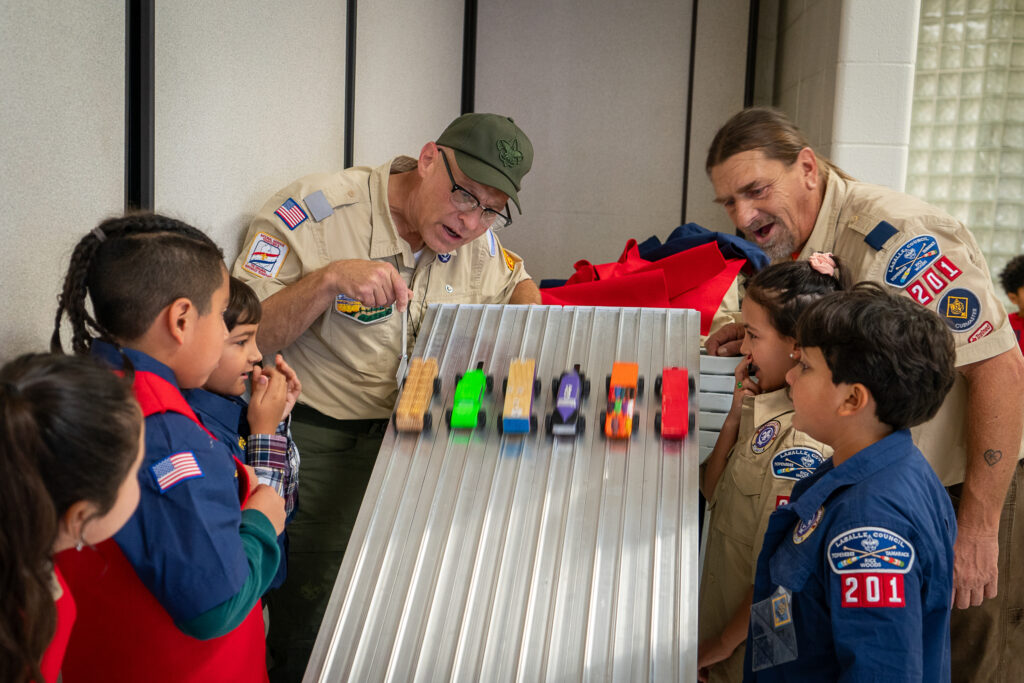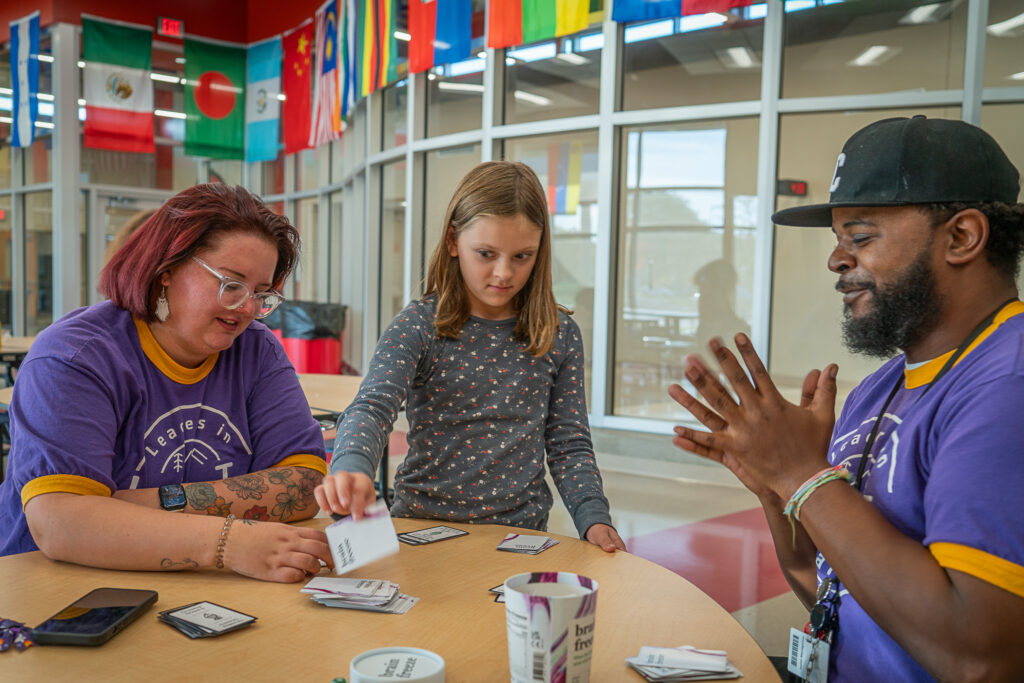2023 Annual Report:
Sharing Stories and a Commitment to Young People
John M. Cary has spent nearly 25 years working with the Boys Scouts of America, serving local councils in various roles: leading councils, connecting with volunteers and raising financial support for scouting. He’s a veteran of the youth services sector.

John Cary and Jeff Smith
But when Cary joined nearly 230 other Indiana youth workers in Indianapolis in August 2023, he says he experienced “a new synergy,” an exceptional opportunity to learn together and support one another. The event was a convening of national youth organizations and their Indiana affiliates funded through Lilly Endowment’s initiative, Strengthening Youth Programs in Indiana (SYPI). The initiative is helping youth-serving organizations improve their abilities to promote the academic, physical and social well-being of Indiana young people, ages five through 18.
The gathering was the first time that professionals from these organizations participating in the SYPI initiative came together to network, share meals, learn from one another and hear from leading national experts in youth development. Cary, now CEO of Boy Scouts of America, LaSalle Council in South Bend, Ind., says the event offered the potential to create better partnerships between youth-serving organizations across the state. For the first time he was in the same room with several organizational leaders from his region with whom he hadn’t worked before.
“The possibilities for collaboration are real and abundant,” Cary says. He knows from experience how deep the need is. In his daily work with 2,000 scout leaders in eight counties in northern Indiana and southwest Michigan, Cary has seen demand for scouting explode by 30 percent since 2021. Some of that growth is due to a post-COVID enthusiasm for getting kids interacting again, but it’s also the result of a strategic effort to connect the community to Boy Scouts programming, Cary says.
Funding for the Boy Scouts of America is helping the council in northern Indiana redevelop Frederickson Park near the South Bend scouting headquarters. It’s also supporting the development of a STEM summer camp, which in summer 2023 served 600 kids. SYPI-funded efforts are strengthening partnerships with local schools and helping Boy Scouts of America reach young people who have often not been engaged in scouting. Cary hopes that in future summers the LaSalle council will double the number of youth who come to launch rockets, learn about local flora and fauna, and study the animals that can be seen at the new observation deck overlooking a pond at the newly upgraded park.

Jeff Smith and Thomas Hodges of the Boy Scouts of America, LaSalle Council work with students at Wilson Elementary School in South Bend, Ind.
“I have a card on my desk from a Boy Scout camper who wrote, ‘this was the best week of my summer.’ I keep it as a reminder of how fortunate we are, what a blessing it is to share and make a difference in kids’ lives,” Cary says.
An ambitious agenda
For Indiana’s youth-serving professionals, the 2023 convening offered a full agenda, including an overview of the new Indiana Youth Worker Well-Being Project. Interactive breakout sessions covered a range of topics: how to respond to the youth mental health crisis; what it takes to help youth workers develop deeper relationships with young people; and how to make youth work a strategic and collaborative priority across an entire community.
A keynote session featured San Diego State University psychology professor and author Jean Twenge, who urged better understanding of the cohort of children that some have called the “smartphone generation.”
Twenge offered an overview of her research about today’s young people and the impact that their use of digital technology is having on their well-being. These teenagers and their younger siblings (collectively Gen Z and Generation Alpha) are spending an unprecedented amount of time focused on screens—especially smartphones loaded with social media apps. As the number of young people who have access to cell phones and social media has increased since 2012 so has the number of young people who report struggling with mental health challenges, including anxiety, depression and thoughts of suicide.
The data was a stark reminder of how important it is for youth-serving organizations to continue to strengthen mental health services for young people and provide opportunities to support their overall well-being.
“We need to understand them, we need to look out for this generation of young people,” Twenge says. The presentation hit home with the audience, according to Andrew Gritzmaker, CEO of YMCA of Greater Fort Wayne.
“It was heartbreaking, but it is also hopeful to look around the room and see all the dedicated professionals focused on our youth,” he says.
Discovering common ground
What happened outside of the learning sessions also proved powerful. Discussions in breakout sessions and during conversations at meals helped reinforce a new solidarity. For Gina Freeman, executive director of Big Brothers Big Sisters of Southeast Indiana in Madison, Ind., meeting fellow youth workers from across the state offered reassurance. It makes a difference “knowing that other agencies have some of the same issues we do in rural Indiana, and that we have partners in youth work whom we can call upon when we have questions,” she says.
And for many of the participants it was a rare opportunity to step away from the seemingly endless daily demands front-line youth workers face to create and maintain safe—but appropriately challenging—spaces in which young people can grow and learn.
“We’re so busy with the day-to-day,” says Alexis Gutierrez, director of school age childcare at Lafayette Family YMCA. “The meeting in Indianapolis was more about the bigger picture.”

Alex Guitierrez and Justin Montgomery work with youth at Lafayette (Ind.) Family YCMA.
Communities in Indiana and throughout the United States depend heavily on organizations like Boys and Girls Clubs, YMCAs, the Girl Scouts and other nonprofits for enrichment activities that help kids thrive outside of school. Some provide traditional summer camp and outdoor adventures or creative outlets for STEM and the arts, but all offer opportunities to build connections and social skills that youth need. Often, these organizations provide the only such programs in their neighborhoods, towns and counties.
They all also share something else: a reliance on creative, passionate front-line youth workers who connect with young people and on organizational leadership that ensures that the required behind-the-scenes fundraising, programming, marketing, and administrative support is available.
For Gutierrez, a typical day begins at 5:30 a.m. with a review of daily staffing assignments for the before- and after-school child care the Lafayette Family YMCA provides, both at the Y and at local schools. At age 25, she’s the Lafayette Y’s youngest director-level employee. She oversees a staff of 36 youth workers and school-year programming for 380 students in kindergarten through eighth grade. The number of kids served balloons during the summer, when the local Y provides supervised recreation for 850 youth.
Planning and overseeing snacks, STEM activities, outside play and gym time, and opportunities for social-emotional learning are all part of the job. But the hardest part is staffing, she says.
“The challenge is not just getting staff, but getting staff who want to be there. Some people see it as a babysitting job, but really it is an opportunity to teach,” Gutierrez says. “At the Y, we’re working on developing the next set of our community’s leaders.”
That’s why Gutierrez was thrilled to learn that a project she had longed for would be funded through the SYPI initiative. In her work with school-age children, she noticed a gap in opportunities for middle-school youth. The Lafayette Y received SYPI support to expand youth programming, and Gutierrez got the green light to work with local middle school principals to establish after-school programming.

Now students at two Lafayette middle schools can opt in to the Y’s on-site, afterschool program three to four days a week. Like many middle schoolers, they have their own agenda and Gutierrez leans into that tendency, allowing them to plan activities, which recently included sushi-rolling and candy-making.
Gutierrez is newly energized, too. “It was a double win,” she says. “It was the first time I got to start a program of my own, which felt like a big professional accomplishment, and our middle school students finally have something of their own.”
Convening matters
During the convening luncheon, Cary, of the Boy Scouts in South Bend, sat with four other youth workers and listened quietly as they described some of their frustrations. When Cary finally spoke, he offered only encouragement.
“It’s so easy to get down, but we are making a difference,” he said to new colleagues at the table. “We are doing good, important work and on the more challenging days, stay focused on the positive and keep moving forward.”
The luncheon pep talk wasn’t the only time that Cary noticed the need for mutual support. During a breakout session, one young professional confessed that she thought she was the only one confronting a particular challenge under discussion. “She felt isolated, like she was the only one with this problem,” he recalls.
“The big takeaway was how all of the organizations represented share the same passion to serve young people,” Cary says. “We face similar challenges too. But in sharing our stories we remind each other that we’re in this meaningful work together.”
The aim of Strengthening Youth Programs in Indiana is to help youth-serving organizations improve their abilities to promote the academic, physical, social and emotional wellbeing of young people, ages five through 18.
In 2023, Indiana Youth Institute (IYI) launched the Indiana Youth Worker Well-Being Project, a five-year effort to improve the lives of individuals who work with children and youth in Indiana. The project is a collaborative statewide effort to support Indiana’s youth workers so they can more effectively serve youth in their communities. IYI is collaborating with Indiana Afterschool Network, IARCA Institute for Excellence, Indiana Youth Services Association and Marion County Commission on Youth.